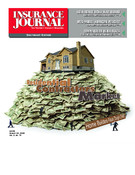Our compensation system is under attack, independent agents put about $2 billion in their pockets due to profit sharing and it is under attack, there is no doubt about it,” Bill Stiglitz, Independent Insurance Agents and Brokers of America president-elect told Alabama Independent Insurance Agents at their annual convention. “There is no doubt about it, we have to educate the public about the difference between a profit-sharing agreement and other contingent arrangements.
“We have to get that word out and are starting to make some inroads on the difference between an independent agent and broker with a lot of press on that,” Stiglitz said. “We are trying to push that through and get the word out but it is going to take a lot more advertising to do it. I believe we will get the word out and that agents are not part of that mess that took place in New York.”
Stiglitz said large brokers have given up on PSAs. “I think that was premature and stupid, there is nothing wrong with an agreement,” he said. “As long as you follow through with what you are supposed to do, and as long as you’re not bid-rigging-that is despicable and people should be put in jail and they should be fined.”
Stiglitz emphasized it is important to educate and inform the public about the difference between a broker and an agent. He said they need to know the difference between a
profit-sharing agreement and a contingent arrangement.
“I believe it will be preserved when it comes down to the end,” he explained.
“The sales culture of America is under attack,” Stiglitz said. “When you have someone like Eliot Spitzer who wants us to divulge what we make, how we make it, and so forth-well then let’s have the potato chip maker do the same thing; the car salesman do the same thing; let’s have the guy who sells rubber, steel or anything do it.
“I can see the steel beam, the steel company says we paid $12.50 on this beam, the distributor made this much, and you have to put it on everything you do. Well the sales culture of America is under attack, we have to stop it now and I think independent agents will have to do that.”
Stiglitz said in October 2004 the Big I got ahead of this issue and put out a disclosure policy from its board that applied to brokers, urging them to disclose what they made regarding back-end agreements. “We were lucky we did that and it was due to the foresight of our staff.
“We do not have a problem with agent disclosures,” Stiglitz explained. “I have had one client ask me what I was making on a policy and when I answered that I make 15 percent on a package and maybe 15 percent on auto and perhaps 2 to 12 percent on workers’ comp they said, “Is that all?”
Stiglitz said most clients think we are getting 90 percent commissions, like the life insurance guys and that’s just not true. “They are often amazed at how little we make,” he said. “So it’s not an issue with independent agents.
“Once again, our friends on the trial bar have decided in their wisdom that companies should disclose what agents make. We have recently had calls from Drive, they ran a flag up and said that on every policy we issue we are going to put your percentage of commission on it.”
Stiglitz said the response was so great that he burnt up his Blackberry and encountered “a firestorm from the agencies, to say the least.” He said it’s absurd to put the percent of commission on the policy, and that Drive has now decided to use a very generic disclosure form. It’s going to be part of the package, printed out as a separate document, and it really isn’t anything to be afraid of, Stiglitz said.
“However, we have several cities that don’t want any disclosure, none,” he said. “At our July committee meeting we formulated a policy on our position and we will see what happens next. In the meantime, other carriers have come out with generic messages, like St. Paul Travelers.”
Stiglitz said this is an ongoing issue that will be continuing to develop and he guaranteed the board will be ready for it. “We will meet in September in New York City, and will get through this particular issue, which is certainly a hot one,” he said.
Putting the SMART Act in a nutshell Stiglitz sees the real possibility that IIABA could be looking at either an optional federal charter or total federal regulation of insurance.
“Almost five years ago we put together the SMART Act,” he said. “We didn’t put together the 17 sections, just the idea, which is basically, let’s put some federal standards up, states would have to them under federal law and we would change the marketplace and make it more uniform and easier to do business.
“That is really in a nutshell what the SMART Act is all about. Now, it has gotten blown up with 17 sections and there are some real issues with that. It is a living document and it is ongoing, there is nothing written in stone yet-so we are urging that the House go ahead and start doing something about the SMART Act. We recently held a hearing, as Commissioner Bell mentioned, but NAIC has put out two letters that have basically disengaged them from the whole process of the SMART Act.”
According to Stiglitz, what has happened now is that there is a new coalition consisting of the bankers’ association and seven organizations. They just wrote a letter to the Senate that basically asks for a optional federal charter and it was co-signed by more than 200 companies. “The commissioners have to realize if they don’t go along with some recommendation there are going to be federal standards in which companies can operate quickly and more in a modern age-like situation. We are going to end up with federal chartering and who is going to jump on that?” Stiglitz asked. “First, every life insurance company wants optional federal chartering and I’m not sure if independent agents need to oppose that because our insurance companies operate a little differently. However, your national companies are going want to be federally chartered. That is going to take them out of the purview of the Walter Bells, who are wonderful commissioners that do a great job with their constituents and guess what, replace it with a new federal bureaucracy.
“We think it is opening a new huge Pandora’s box by going with a federal charter,” he continued. “We urge NAIC to be engaged with us on the SMART Act, we hope that as this continues to move, we are starting to see a little action in the House, it looks like the optional federal charter folks are going to start soon in the Senate, and that goes right back to Senator Shelby.
“We know, him, I have talked about this and we are going to be opening some connections with the senator to let him know where we stand on this and we will see what happens,” Stiglitz said. “It is not going to be a rapid process, it may not pass for another five years, but it’s got to be an on-going discussion and your association is 100 percent engaged on it.”
Stiglitz said InsurPack is doing great, raising $1 million in the first two years and has now raised its goal to $2 million. Trusted Choice is doing terrific with 4,980 agency memberships. That is a huge increase over the last six months.
Bill Stiglitz, IIABA president-elect
Topics Agencies Talent Independent Agencies
Was this article valuable?
Here are more articles you may enjoy.


 Winter Storm Fern to Cause Up to $6.7B in Insured Losses
Winter Storm Fern to Cause Up to $6.7B in Insured Losses  Allstate CEO Wilson Takes on Affordability Issue During Earnings Call
Allstate CEO Wilson Takes on Affordability Issue During Earnings Call  India’s GIFT City Attracts Lloyd’s and Other Global Reinsurers, Sources Say
India’s GIFT City Attracts Lloyd’s and Other Global Reinsurers, Sources Say  The $3 Trillion AI Data Center Build-Out Becomes All-Consuming for Debt Markets
The $3 Trillion AI Data Center Build-Out Becomes All-Consuming for Debt Markets 


